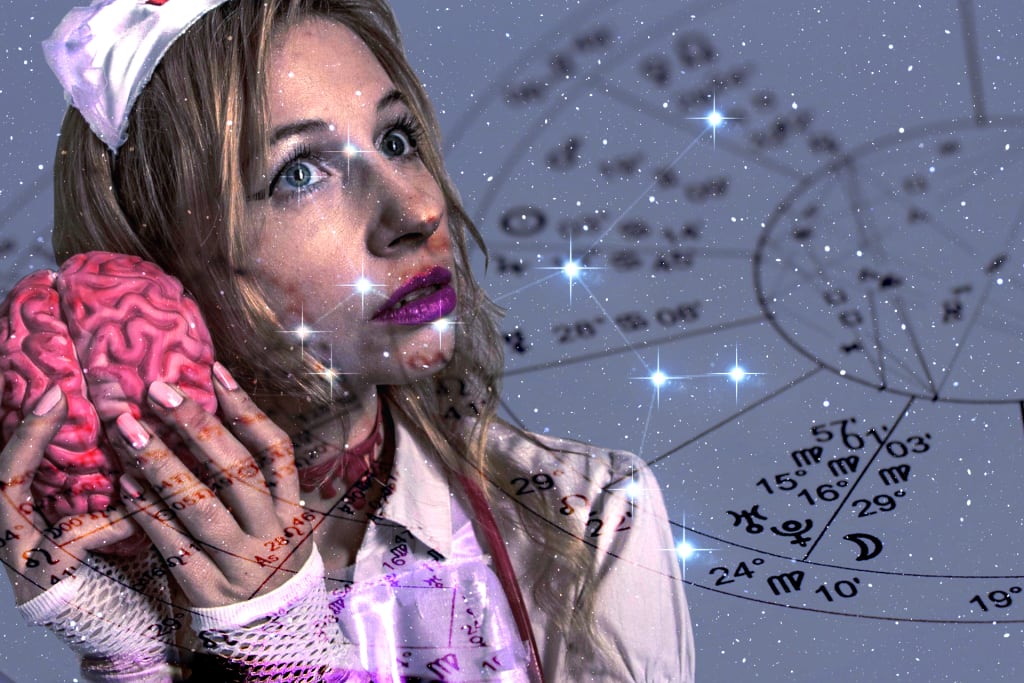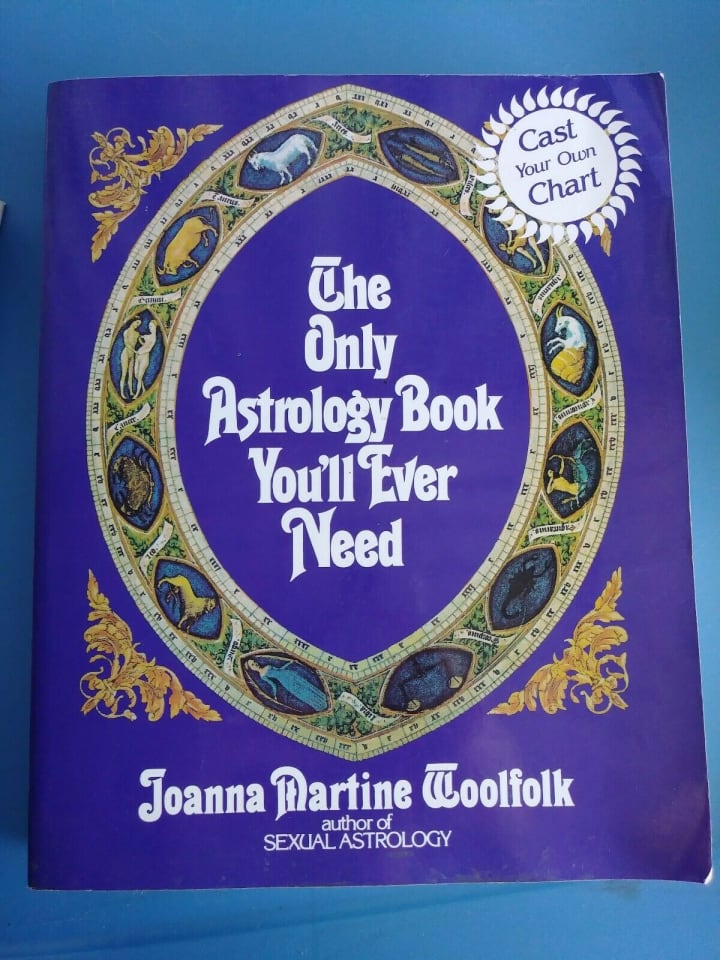How Horoscopes Hijack our Hinterlands
The Surprising Psychology of Astrology

When I was a child, I had a huge fascination with the mysteries of the universe. I loved learning just about anything I could, which included a healthy interest in science, but also a wild curiosity about the supernatural. As a result, my adolescent years looked a lot like the Harry Potter series, sans magic. I played with ouija boards, went ghost hunting, tried automatic writing, runes, tarot cards, scrying, spells, rituals, crystals, and basically everything else under the full blood moon, except necromancy. Of course, no childhood foray into the dark arts is complete until one has given astrology a fair chance to prove itself. My own experiences with this ancient and still widely-accepted practice of divination began around the age of 10, when I got my hands on a copy of The Only Astrology Book You’ll Ever Need by Joanna Martine Woolfolk.
Woolfolk’s astrology book is still wildly popular and her publisher will probably keep putting out new editions until the end of time, so rest assured the title is as accurate as they come. I vividly remember scouring its pages in the chapter pertaining to my star sign, Pisces, with the hopes of learning more about myself. Every line I read with anticipation, wondering if the next would apply to me and my life. For a couple years, when I got crushes I would read the descriptions that explained how each astrology sign was predicted to fare with other signs in relationships. I would read entries about the signs of friends and family, thinking I might be able to understand our dynamics a bit better. I must say, I felt like a lot of what I read, especially the description of Pisces, applied to me quite well. Many of the statements really felt like they fit me and, as such, I really felt like a typical Pisces for many years of my life.

Of course, there is a very specific reason that my horoscopes seemed quite fitting for me aside from the obvious; that is what they were made to do, after all. Though, before I peel back the curtain on the art of star reading, we ought to take a step back for a more complete view of the subject and the landscape it exists within. When considering the practice of astrology, I must confess that I have no current understanding of the trends that sweep its modern conception. I muse about the subject, from time to time, now being a relatively skeptical person, well convinced by the scientific method and empirical evidence, though still just as curious as I was in my youth. At this time in my life, astrology is one of many avenues that I feel I’ve explored sufficiently to make an accurate determination about, but it’s still an interesting topic, albeit interesting in a different way now.
Since astrology has roots going back over 6000 years, one would think it should change over time, as the heavens we once observed from afar can now be seen more clearly and closely than ever before. More information about the celestial bodies in our solar system should have changed the way astrology was conceived. Proponents of astrology argue that it is a science, but the birth of astrology was about 1000 years before that of science. Astrology has had more than enough time to adapt and to provide ample results, especially given the findings of modern cosmology. Yet it cannot make accurate predictions, which is what would be required for it to be a science.

Despite its inability to make accurate predictions, astrology is still a widely-accepted practice, as horoscopes are still routinely printed in magazines and newspapers today. Obviously, many people feel that there is something to it, which is also true of my younger self. As previously mentioned, horoscopes and astrology signs were made to be fitting descriptions of human personalities. The reason for that is because they take advantage of a particular psychological phenomenon we call the Barnum Effect. This effect occurs when people believe that personality descriptions apply more specifically to them than to other people, despite that description being vague and filled with information that applies to everyone.
These types of sentences are called “Barnum Statements” and astrologers exclusively use them for all of their descriptions of astrology signs, their interactions between other signs, and every horoscope that has ever been written. The fact of the matter is that, whether astrologers or their readers are aware of it, the Barnum Effect is entirely responsible for whatever success astrology has had fooling people into thinking it is a science.
The notion that the position of planets has a direct effect on our personalities, while untrue, still has a profound impact on our lives. What we believe matters, because it informs how we act in our lives, the decisions we make and, thus, our effect on the lives of other people. It’s important that we do our due diligence to make certain that our beliefs comport with the reality in which we live. If we fail to recognize our false beliefs, we will be unable to resolve the flaws in reasoning that cause them, which may be hurting us in other areas of our lives. Richard Dawkins, renowned evolutionary biologist and famous atheist author, hosted an illuminating documentary called The Enemies of Reason, during which he took a look at astrology, even going so far as to have a lengthy conversation with a career astrologer. During the course of the astrology segment, he even led an experiment which illustrated the Barnum Effect quite well.
In the experiment, Dawkins took horoscopes from all 12 signs and mixed them up, so that none of the horoscopes were actually with the right sign. Then, the horoscopes were distributed to people who were born under the sign on the (incorrect) horoscope. After reading it, people were filmed and asked to explain how accurate they felt the horoscope was for them and their lives. On the whole, people still felt the horoscopes they received were accurate to them, despite them having been originally written for a different sign. This experiment is even something you can try yourself, which is why I have such a fondness for it. There’s something visceral and wonderful about actually getting your hands on some science yourself and seeing how things play out in the real world. Astrology itself is all theoretical, but how things work in the world is what really matters.
For something to be a science, or really to be reliable at all, it has to be replicable. When it comes to astrology, it has been shown to be no better than chance at predicting personalities, outcomes of relationships, and the future. What has been called the Carlson Study is perhaps the best study exposing the ineffectiveness of astrology. It was published in 1985 in the science journal Nature, making the modern popularity of this subject a possible resurgence before its death knell. In many ways, I view the popular opinion on astrology just like my own opinion when I was a child who diligently believed in astrology.
The internet has connected us all and, now, we are all able to converse about the things that interest us. In the case of astrology, I see a fair comparison between the mental journey of the individual and the journey of the consciousness of the wider group of people talking about this subject online today. Just as I learned about astrology and explored it as an option to explain the things in my life, so too are other people doing that in online discussion today. For a while, people will talk about it and work with it and be fooled by it. Though, if the person makes an effort to learn about the science that disproves it, tests it for themselves, or is especially observant or lacking in bias, they will come to see it for what it is; a clever word game and nothing else. It is just another way in which the human mind can be fooled, just like a verbal equivalent to an optical illusion and nothing more.

Still, we must not forget that, despite how harmless some false ideas can seem, like astrology and the novelty of horoscopes, some people do view this practice as true. Some people even base their lives upon these things, with disastrous results, mandating the hobbies their children can and cannot do and who they can and cannot date or be friends with, based solely on an astrological basis.
So, with all this in mind, what ought we to do in light of astrology? We could stop printing them in publications, but this suggestion is just the same as recommending that we just stop printing the Bible. It’s to do with some people’s deeply-held personal beliefs, it’s not going to happen, and so it’s not even worth talking about. Before horoscopes are ever done being printed or posted anywhere, there has to be a deeper societal change. The average person needs to be more educated about this topic before it fades out of all our lives for good and I think this is what is happening online today. I view the online spaces where people talk about these sorts of ideas, which are soon to be extinct, as way stations for people to pass through on their way to being a more educated modern adult.
The information which we know to be true, because of true scientific discovery and rigor, is also available online. Anyone with a sufficient level of curiosity can easily find out the truth in less than a couple of minutes. Perhaps this very article will help someone out in that way. We need not do anything in particular for the falsehoods of astrology to become a distant memory, aside from merely having the conversations we are having now, in the various places that we do. Facts cannot be ignored, nor denied forever, so simply speaking the truth when others are unaware is all that is needed. Look at horoscopes as a novelty and use astrology as something to teach our children about the past and how humans used to try to understand the world. Then, just like with Santa Claus, let’s break the fourth wall to teach them the fascinating real-world facts behind it. The truth is always more interesting, after all.
Sources:
The Barnum Effect : https://en.wikipedia.org/wiki/Barnum_effect
Richard Dawkins' Enemies of Reason: https://www.youtube.com/watch?v=dlMiKrwCRQ0
The Carlson Study: http://www.objectiveastrology.net/uploads/1/6/7/2/16726802/a_double-blind_test_of_astrology_carlsons_original_article_in_nature.pdf
About the Creator
James S. Bray
Writer of fiction and non-fiction alike 🖖
Check out my book: 'The New Frontiers of Lucid Dreaming' on Amazon!
Connect with me elsewhere: Linktree






Comments
There are no comments for this story
Be the first to respond and start the conversation.